Tangible heritage adds great value to rural and cultural tourism
- The Pamplona communicator Gaizka Aranguren tries to collect an intangible heritage and present it back to the world. Among all our intangible treasures, the largest is the Basque.
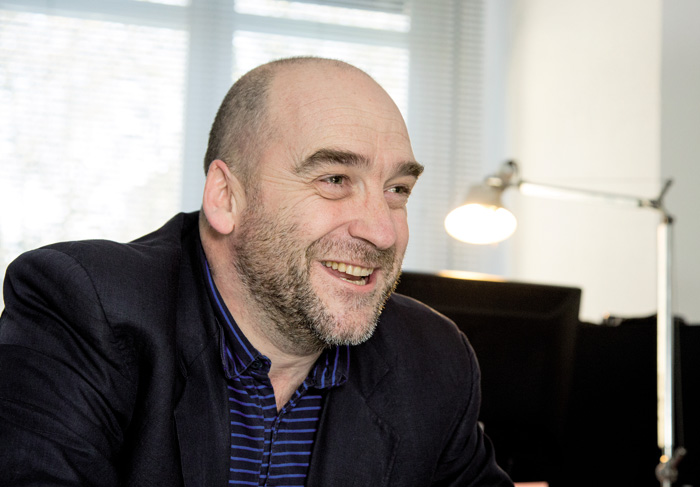
I have heard that you are a choleric fisherman.
Yes. I look for trouts in the small streams of the Pyrenees. Like the Basque Country, fishing in Upper Navarre has three areas: the salmonic area (mountain area), the mixed area and the cyprinic region (central area and bank). The former predominates trout. The field of life of this fish is, in a way, like that of the Basque in the Upper Navarre. On the other hand, trout is in a terrible decline, probably due to climate change. If the average water temperature of the river rises one degree, the trout rises one kilometer in search of fresh, oxygenated water. That's why they disappear throughout the northern hemisphere.
Is there also equality with the Basque Country?
Yes, yes. “The amorosity of the Basque Country”. That could be a good title.
Are you also the child of the ikastola San Fermín?
There I learned. As some people now say, at the time of San Fermin-lobby, but not of that lobby. Then I did it at the Irubide Institute, and then I went to Leioa to study journalism. When I finished, I became a new diplomat in European Studies. I have always believed myself to be very European. I have always found Europe a very interesting objective as a political project, but not, of course, that model that was being built and is now being dismantled. We Basques have a unique opportunity to assert our European political character. We are indigenous to Europe and I believe that we can make a great contribution. The idea of European indigenism has its small and attractive point, also at the level of communication.
Your professional activity started in EiTB. The prison interrupted his journalistic activity.
At first he walked around making replacements in the Basque Country Irratia, just finishing the first course in Journalism. From time to time I went through all the residences. Both on the two radios and on television. I was about to go to Baiona and Brussels.
At that time, the input was in full swing. I didn't want to go to the line and I jumped in. I got full of myself in that movement, and the jail interrupted my work on television.
At first, I stayed for five or six months in the third grade, going to jail only to sleep. Then we decided to plant ourselves and then we got into the 2nd grade. I was there for a year and a half.
What has this experience brought you?
We have said many times that we do not win, because we were antimilitarists and because armies are still there. It is true, but the immediate objective of the input was to put an end to military service and we succeeded. It was a victory, but in this country it often happens to us that the members of that critical mass that we are in abstract, transformative aspirations never know when we have won, and so we don't get the juice that corresponds to victory.
By the time we realize that we've won, we've lost the opportunity to capitalize on ourselves, and we have to turn that around. At that time, facing fear, part of my happiness comes from being consistent. That is what gives me the strength to believe in the initiatives that are taking place today in line with nonviolent civil disobedience. It's not the same to be 20 years old than 50, but now, after the kids have grown up, I look forward to that path again. Recently, here, I had the opportunity to participate in the Herri Harresia that was made in Nabarreria and I did it with passion.
You had a reputation as a handsome presenter, but also as a rebel. Why?
By the time, by the place, by the influence of the media... I had great control. Political and linguistic discrepancies were, for the most part, the origin of the situation. I am a child of the ikastola, my parents did not know Euskera, my dialect is batua, but I have always resorted, like so many others, to the molds that were used in theory in Pamplona. So I've always said in the writing that I'm a follower to Aingeru Epaltza, for example, and that was banned in ETB. I could not use “another” or “say”, for example, and the boss told me that if I had doubts I should go to the Gipuzkoan. Of course I had no doubt about it! Fortunately, I believe that this is a subject that EiTB has long overtaken in the right direction. At the same time, I felt an immense lack of respect for the Upper Navarre and for Iparralde. Someone warned me that television was paid by CAV citizens. I understood the message. It was not a television for the Basque Country.
On the way out of jail with ETB doors closed?
Yeah, and I showed up in Pamplona TV. At the time I was organizing a Channel 4 that would be broadcast all over Navarre and in a few months I was responsible for information.
I was about three years old. There, too, I had huge shocks. An entrepreneur who had 51% of the shares on the TV board kept me for professional, not ideological reasons, and the rest were UPN Commissioners. I had great pressures to put on the blue loop or to remove Sanfermin’s red scarf when they killed Miguel Ángel Blanco… So, I went to the Euskaldunon Egunkaria.
It was hard for me to go and come to Andoain every day and after six months I saw an announcement. A livestock company needed a manager and said that Euskera was essential. It was a veterinary company. I had to learn everything about livestock, because I didn't know anything, but I had experience organizing working groups and working on communication, both inside and outside the company, and I was very comfortable.
We started doing the veterinary journal, and today we continue to do so at the Labrit. 7,000 farmers receive it in the Spanish State. It has 36 pages in color, financed by contributions from suppliers and laboratories. It's a very interesting company, and since I met them, I love the farmers.
In our society, as a citizen, we are not aware of the extent to which farmers are working to make the fields of our dreams look like this. We citizens would have to pay a special fee for being our gardeners to those who live in the countryside.
Why did you work on creating Nabarralde?
They called me to participate in the creation of the project and I entered because I agreed with their goals. The objective was to put on the table that some references of the Basque imaginary have to do with the juridical-political structure of the time. From a historical and legal perspective. This is the line of discourse, cultural and ideological that was elaborated by the ancient Euskaldunes, Arturo Campión and all of them, but that did not become political.
Bizkaitarrism, on the other hand, was succeeded by Aranism. Although less intellectually and historiographically cultivated, it had a great ability to move forward politically. That's why nationalism drinks mostly from Aranism. It was created to somehow advance this area of Nabarralde, not to deny anything but to warn that you should not drink only from Aranism. It's not enough for us all to come together, and that's what reality is showing us. With the contribution of other references and enriching the perspective, then one can do a Basque national project. I believe in that. The vision of Euskal Herria must be asserted in both directions. Aranism claims Berdism and Atlanticism, but 60% of the territory is not green, at least in most times of the year.
You have also participated in the Nafarroa Bizirik initiative. Has it been the nightmare of UPN?
They obviously have a lot of contradictions. Initiatives such as Nafarroa Bizirik show that if they rub a little on the presumed flag of Navarre that they place ahead, in the centre it immediately comes out of gualdo color. Nafarroa Bizirik was the idea of Eugenio Arraiza. I thought the anniversary of the conquest was approaching and something had to be done. In 2003, he published a book about Sancho the Elder with historians Roldan Jimeno and Aitor Pescador, and that was his precedent.
We set up Nafarroa Bizirik and it had its first seat in a room in my house. Our idea was to make a surfer in the wave that the regime would create. Evolution taught us that the whole wave was created by Nafarroa Bizirik. From there, the change in this concrete historical reference has occurred in the hegemonic discourse. Now no one denies that Upper Navarre was conquered militarily in blood. It's very important in people's imagination. That has been achieved between four and five years ago. I am not a historicist at all, but I believe that among all these references that form collective imaginaries on the path of the creation of the identity of individuals there are also ideas of the collective past, consciously or unconsciously. And if those references are the same as the Spaniards or the French, what are we? We had to do that work and now we have to integrate it into the education system. Historical references are not essential, but for many people they are very useful in shaping their imaginary and, therefore, in their political identity choice.
"We citizens would have to pay a special fee for being our gardeners to those who live in the countryside"
What importance has your family had in its political conception?
I have drunk the patriotism of my family. The mother, born in Caracas, from PNV and EA, was the daughter of Salvador Urrotz, a gudari from Roncesvalles. Aita has been a militant of the Abertzale Left since 1977.
He was admitted to prison as Vice Chairman of the Egin Board of Directors and died of a heart attack during judicial proceedings 18/98. I was in Portugal when they closed egin. Then we kept it in various places, because we didn't want it to be stopped. We took him to the National High Court so he didn't go through the hands of the Civil Guard. I went with him and when they ordered him to jail it was the first time I saw my father cry, telling him voiceless, “they say I’m from ETA.” It was by no means true, but he was transferred to Alcalá Meco and, after several months in prison, died in the street, awaiting trial. At home, we've always considered Baltasar Garzón guilty of her father's death.
We live a moment of change in Navarre. How are you?
Very hopeful. We do not realize the importance of squeezing to the slightest victory. It is a great step and it is time to give the utmost help so that the old regime, the fifth column of those who conquered the Upper Navarre in the 16th century, does not return. We have an incredible responsibility and responsibility at the moment.
We're talking about immaterial heritage, and that's what you're focused on in Labrit Multimedia.
I worked at the Euskokultur Foundation with Eugenio Arraiza, leaving Nabarralde. While there, we started working with UPNA professor Alfredo Asiain in the Archivo del Patrimonio Intangible de Navarra. We began a systematized methodology for the integration of contents through life histories and in audiovisual format. When I left Euskokultur, I offered university the services of Labrit Multimedia to be able to continue the work. We make inventories of collective phenomena, collect elements that are shared by a human community and that are generators of identity. It is true that in our area of activity in Europe there are no other companies at present. The communication sector is very important here. Intangible heritage brings great added value to rural and cultural tourism. The essence of the products of the designation of origin, for example, is linked to a place, and that is what we have to show.
An example of that is the campaign you did last year with Roncalese cheese?
For the first time, this is an advertising campaign in roncalés that has been carried out in Euskera. Thanks to its uniqueness, we have achieved great diffusion. The range was multiplied by 26.
Kazetaria, Nabarralde eta Nafarroa Bizirik ekimenetako bultzatzaile. Ondare materiagabearen bilketa eta kudeaketan espezialista den Labrit Multimedia enpresako sortzaile eta burua. Jose Ramon Aranguren HBko zinegotzi eta Egin-eko administrazio kontseiluko presidenteorde izandakoaren seme, eta ETAko kide izateagatik Parisen zortzi urteko kartzelaldia bete zuen Asierren anaia. Euskaldun eta euskaltzale beste gauza guztien gainetik.
“Oso euskaltzalea izan naiz beti. Abertzaletasuna euskaltzaletasunerako tresna gisa ulertzen dut. Ez alderantziz. Nafar Estatua lortzea euskararen biziraupenerako ezinbertzeko tresna da, eta aldi berean, hizkuntza da giza kolektibitate horren biziraupena bermatzen ahal duena. Euskaldunoi hizkuntzak ematen digu identitatea”
“Sal dezagun gure identitatea, baina zentzu onean. Oso harro gaude garenaz, eta kultur aniztasunari eutsiz, gure ekarpena eginen diogu munduari jendeak desberdintasun hori baliozta dezan”
“ETBn aritu nintzen garaian, duela 25 urte, ‘Euskadi’ hitza ez zegoen gaur egun bezain prostituitua, hain kapitalizatua mendebaldeko erkidegoarengatik. Orain erabateko kapitalizazioa dago, besteak beste, EiTBk egin duen lanarengatik, eta hurrengo pausoa dator: Euskadi = Basque Country. Esamolde hori patrimonializatzeko bidean daude. Turismo kanpaina batekin hasi ziren, baina orain Gasteizko Gobernua buru-belarri ari da erabiltzen nazioartean, eta ondorioz euskaldun guztiona zen ingelesezko kontzeptua lapurtu digu. ‘Euskal Herria’rekin berdin gerta daiteke. Garai hartan ere ikusten ziren zantzuak: EAEko buletin ofiziala ‘Euskal Herriko buletina’ da, eta liburu batzuetan ‘Euskal Herriko errepide sareaz’ hitz egiten zuten, EAEko errepideez mintzatzean”
Joan den asteartean La Vanguardia-n argitaratutako artikuluan egin zuen proposamena Txema Montero abokatu bizkaitarrak. 30 urtez Deia egunkariko kolaboratzailea izan da eta lehenik hara bidali zuen bere artikulua, baina egunkariak ez zion argitaratu.
Hemendik aurrera egunkarian soilik "norbanakoen askatasuna eta merkatu librea" sustatzen dituzten iritziak jasoko direla adierazi du enpresaburuak. Iritzi artikuluen zuzendariak hedabidea utzi duela ere argitaratu du.
Egitarau mardula prestatu dute Bergarako irrati libreko kideek: musika, literatura eta tailerrak. Besteren artean, martxoaren 29an Txapa Eguna egingo dute.
Karlos Zurutuza (Donostia, 1971), kazetari ezaguna da ARGIAko irakurlearentzat, elkarrizketa eta erreportaje ugari egin baititu aldizkari honetan. Atzerriko gatazka guneetako bizipenak ekarri ohi ditu berarekin: Kurdistan, Balutxistan, Iran... hamaika leku landu ditu, batez ere... [+]
Diario de Noticias de Álava (DNA) egunkariko langileak sinadura greban daude, eta aspaldi ari dira beren lan baldintza “miserableak” eta horiek kazetaritzaren kalitatean duen eragina salatzen. 2013tik soldatak izoztuta dituzte, eta ordutik erosahalmenaren %30... [+]
Palestinan genozidioa, Europan gerra eta potentzia nuklearren artean tentsioa. Ez daukagu berri on askorik emateko, baina bada bat, hondamendi orokorretik eratorria, aipatzea merezi duena: aldeko baldintzak sortzen ari dira kontrainformaziorako, informazio independenterako,... [+]
Vietnam, February 7, 1965. The U.S. Air Force first used napalma against the civilian population. It was not the first time that gelatinous gasoline was used. It began to be launched with bombs during World War II and, in Vietnam itself, it was used during the Indochina War in... [+]
Hirietako egunerokoa interesatzen zaio Sarah Babiker kazetariari; ez, ordea, postaletako irudia, baizik eta auzoetan, parkeetan, eskoletan, garatzen den bizitza; bertan dabilen jendea. Lurralde horretan kokatzen dira bere artikuluak, baita iaz argitaratu zituen bi lanak ere... [+]











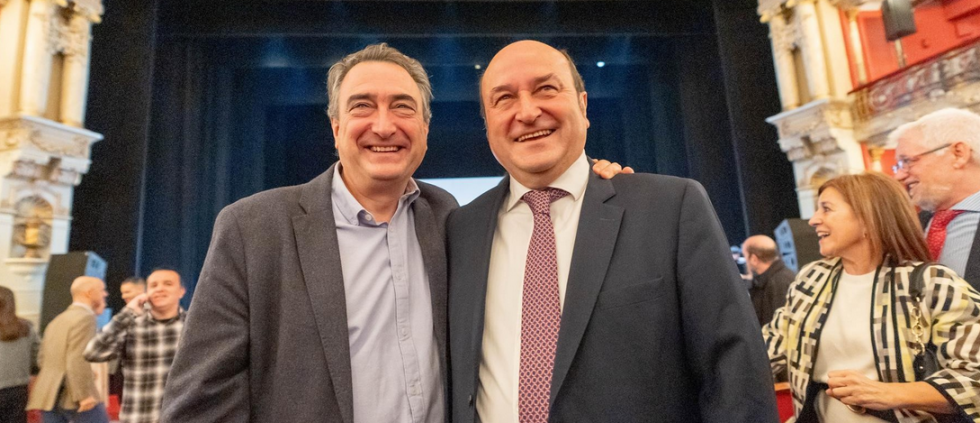

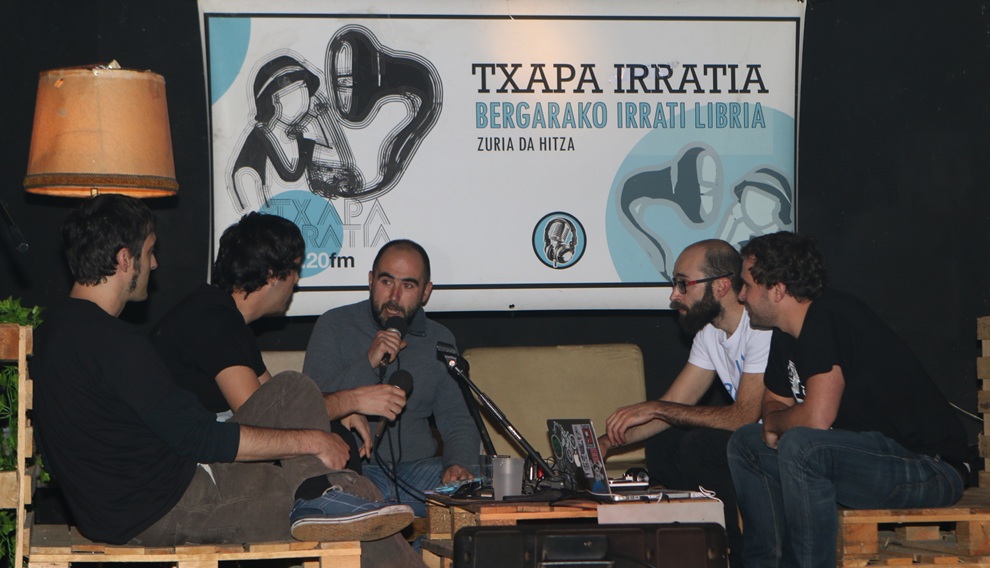


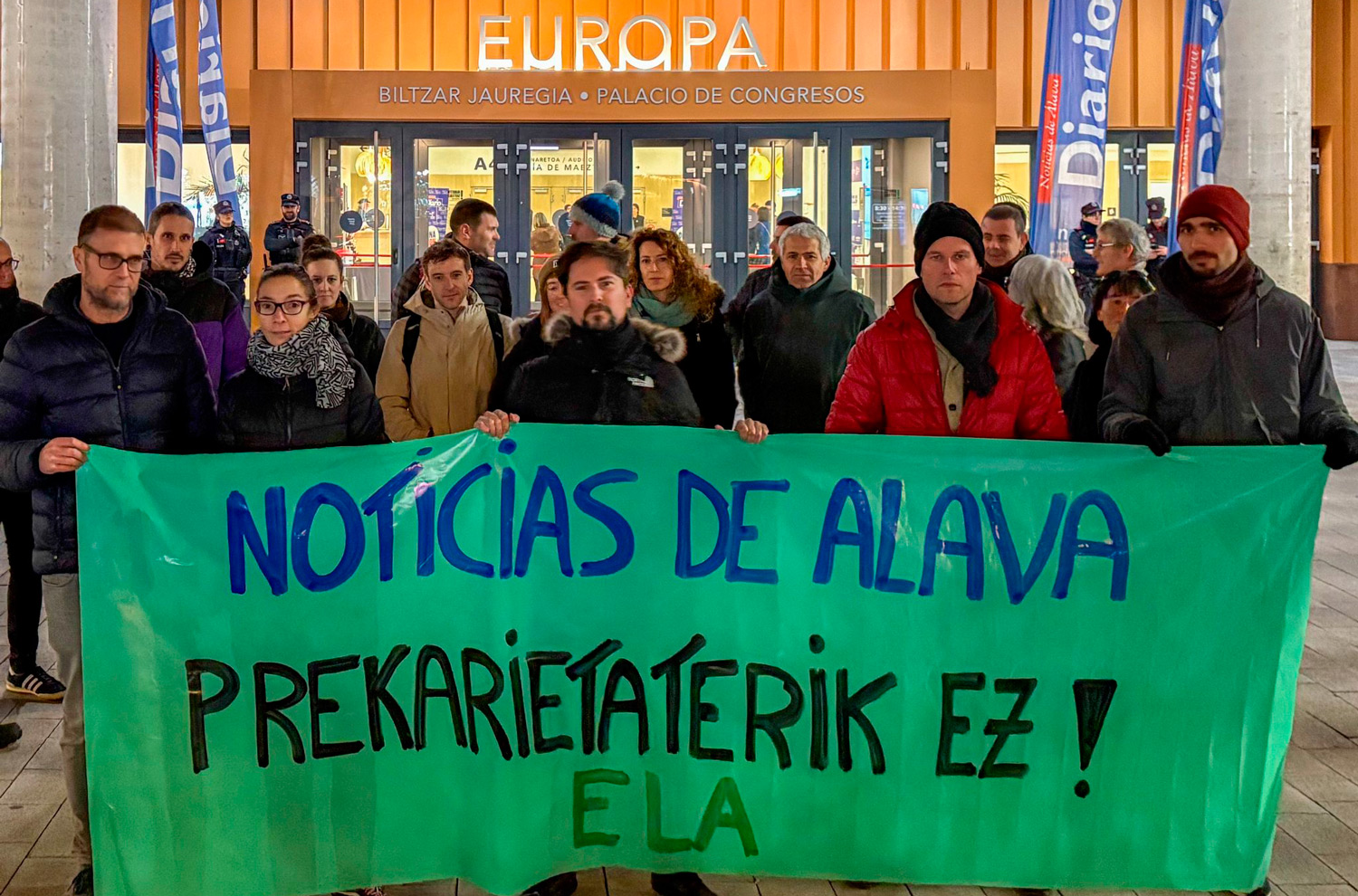
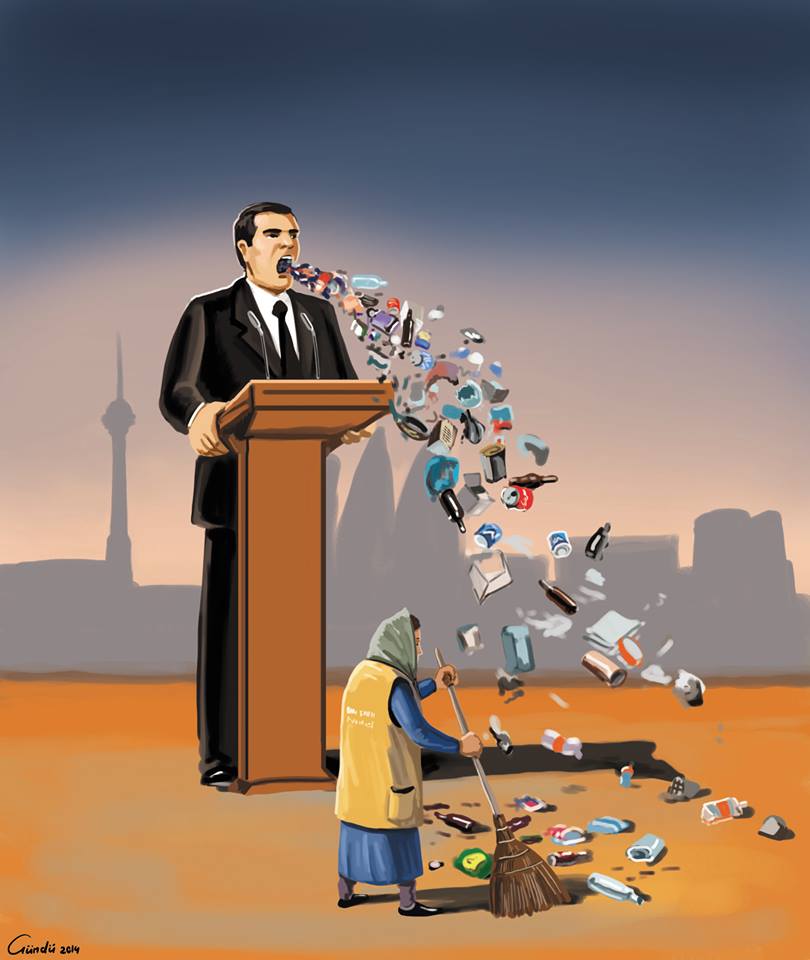

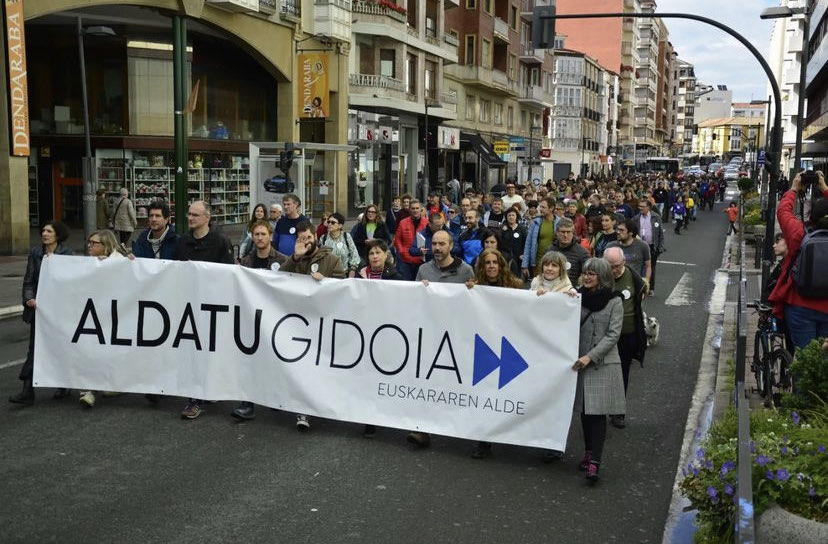

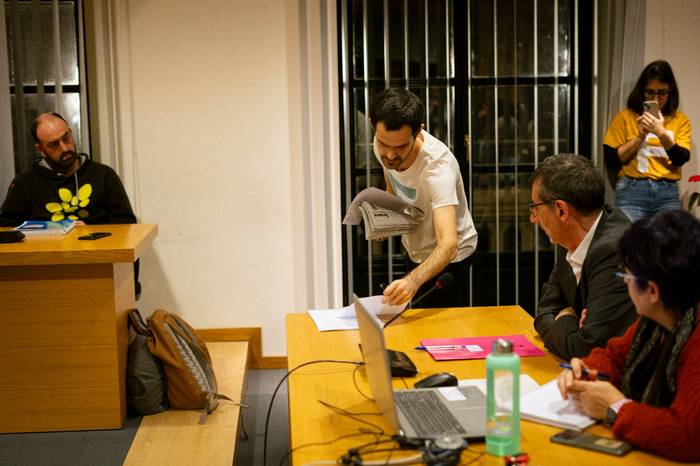


.jpg)
